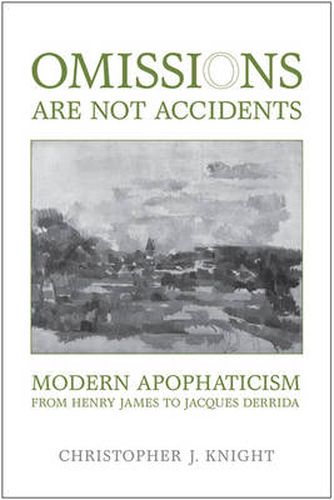Readings Newsletter
Become a Readings Member to make your shopping experience even easier.
Sign in or sign up for free!
You’re not far away from qualifying for FREE standard shipping within Australia
You’ve qualified for FREE standard shipping within Australia
The cart is loading…






Ludwig Wittgenstein wrote in a 1919 letter that his work ‘consists of two parts: the one presented here plus all that I have not written. And it is precisely this second part which is the important one.’ In Omissions Are Not Accidents, Christopher J. Knight analyzes the widespread apophaticism in texts from the late nineteenth to the late twentieth century. In theology, apophaticism refers to the idea that what we cannot say about God is more fundamental than what we can; in literature and other works of art, Knight argues, it functions as a way of continuing to speak and write even in the face of the unspeakable.
Probing the works of authors and intellectuals from Henry James to Jacques Derrida, Knight suggests that we no longer trust ourselves to speak about experience’s most numinous aspect, and explores the consequences of the modern artist’s tendency to imagine his or her work as incomplete. Ambitious in the scope of its investigation, Omissions Are Not Accidents lends insight into an important modern phenomenon.
$9.00 standard shipping within Australia
FREE standard shipping within Australia for orders over $100.00
Express & International shipping calculated at checkout
Ludwig Wittgenstein wrote in a 1919 letter that his work ‘consists of two parts: the one presented here plus all that I have not written. And it is precisely this second part which is the important one.’ In Omissions Are Not Accidents, Christopher J. Knight analyzes the widespread apophaticism in texts from the late nineteenth to the late twentieth century. In theology, apophaticism refers to the idea that what we cannot say about God is more fundamental than what we can; in literature and other works of art, Knight argues, it functions as a way of continuing to speak and write even in the face of the unspeakable.
Probing the works of authors and intellectuals from Henry James to Jacques Derrida, Knight suggests that we no longer trust ourselves to speak about experience’s most numinous aspect, and explores the consequences of the modern artist’s tendency to imagine his or her work as incomplete. Ambitious in the scope of its investigation, Omissions Are Not Accidents lends insight into an important modern phenomenon.